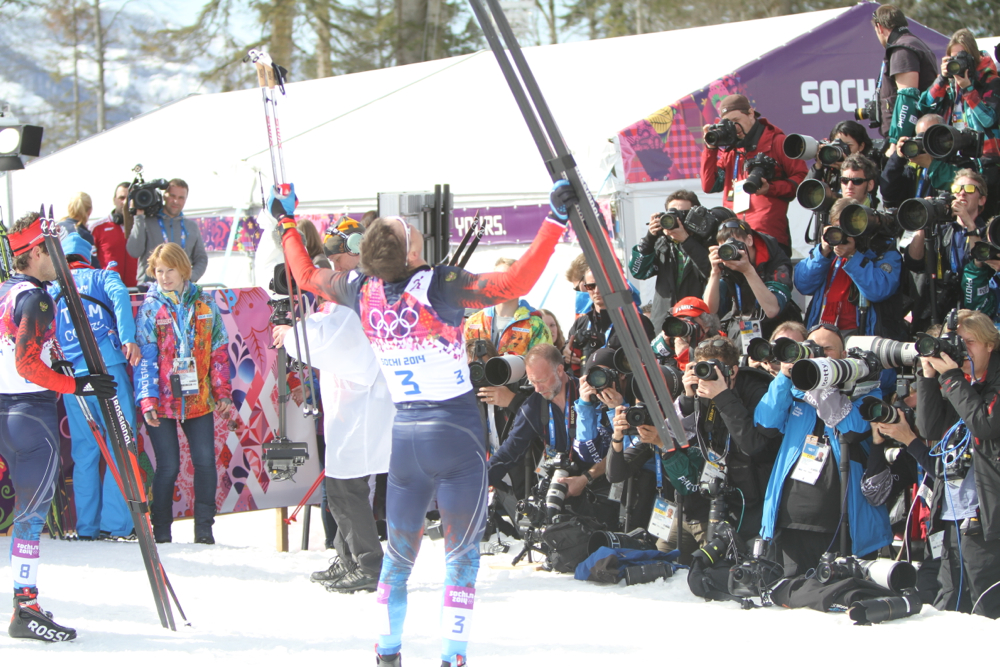
After founding a renegade training group based in Switzerland with Ilia Chernousov as a partner and Reto Burgermeister and Isabelle Knaute as coaches, Russian ski star Alexander Legkov is now on his own, named to Russia’s sprint group but “with his own training plan.”
Legkov has been one of Russia’s distance stars for years, and in 2014 won the 50 k skate race at the Olympic Games. He raced lightly last season, with no standout early-season results; he had the 15th-fastest isolated pursuit time in the Lillehammer World Cup mini-tour, and placed 28th in the 15 k skate in Davos, Switzerland.
After Christmas, in a field that lacked the top Norwegians and Swedes, he finished fourth and seventh in distance races in Rybinsk, Russia. That earned him only one individual start at World Championships: 14th place in the 15 k skate.
Life got hard after the Olympic victory, Legkov told Russian newspaper Gazeta this spring. For four years, he had simply put aside problems with his household and his personal life, and focused only on training and racing. After the gold medal he wanted to spend more time as a normal human being, but it caught up with him quickly.
“It turned out that to live a normal life – it was really hard,” he said, according to a translation. “Just a disaster. I respect the people who live like that. After all, how does your day usually unfold in professional sports? You eat, work out, come for a massage, go out for the second training session. Everything is very simple. But in real life there is nothing simple. Over the last year, I realized it very well.”
Legkov bought a house. He loves cars, hunting, and fishing, and indulged in them. He mused about how the top Norwegians seem to have a good time, and still ski fast. Europeans live a “more confident life” compared to “gloomy” Russians, he said. He was amazed that the Norwegians could multi-task and still win races.
“If it does work turn out in sport, they will find themselves in another case,” he said of the foreigners. “In Russia we have this more difficult, especially with athletes. Imagine a person trained 10-15 years. God forbid, they didn’t win something. They are thrown out like a fledgling bird. Life is a cruel thing, no matter if you are a champion or not. Maybe that’s why we athletes have such a gloomy demeanor. And foreigners have this positive and cheerful outlook on life because it’s easier, although [Dario] Cologna is also a workaholic. He, too, has only one thing in the head – sport. He won’t look for more. With Northug it’s a little different.”
In the early years of his collaboration with Knaute and Burgermeister, there was immense pressure on Legkov and teammate Ilia Chernousov to perform. The idea of the splinter group was approved by the Ministry of Sport, but not the ski federation. Internal politics were intense. Since it was at that point unheard of for Russian skiers to work with foreign trainers, every mis-step was seen as a justification to cut him from the national team.
“He won, and the Russian behind him also started in the Tour de Ski,” Knaute told FasterSkier in 2012 of a situation when Chernousov was forced to drop to the Continental Cup to prove himself again. “But if he hadn’t won, he wouldn’t have started.”
Last season, Chernousov began training with the Norwegian coach Vegard Bitnes. He is staying on that track this season.
Reportedly, Legkov came to the decision to leave Burgermeister’s group himself. Although he is a distance skier, he will be training primarily with the sprint group. His new training partner will be, instead of Chernousov, Sergey Turyshev, who was not named to any of the Russian national teams and finished 37th in the World Cup distance standings last season.
“I hope that the training will not be alone,” Legkov told the TASS Russian News Agency. “Sergey Turyshev, which also specializes in distance races, already expressed a desire to work with me. I want to believe that in this matter all goes well. As for the work on the speed, there won’t be any problems.”
Legkov is clear that although the 2014-2015 season didn’t go well, he is not finished as a skier.
“Friends, I always hear them say, after the Olympics, isn’t it better to leave at the peak?” he told Gazeta. “And start doing some other thing and learn? You’re just playing for time. It is unknown what your results will be after this triumph. But I cannot give up the sport. This is me, and I haven’t run out yet.
“Regarding Northug and Cologna I want to say one more thing,” he continued. “They are the stars of skiing. But when I give myself to the maximum training, I can deal with them. It’s just that this year turned out differently.”
Chelsea Little
Chelsea Little is FasterSkier's Editor-At-Large. A former racer at Ford Sayre, Dartmouth College and the Craftsbury Green Racing Project, she is a PhD candidate in aquatic ecology in the @Altermatt_lab at Eawag, the Swiss Federal Institute of Aquatic Science and Technology in Zurich, Switzerland. You can follow her on twitter @ChelskiLittle.



